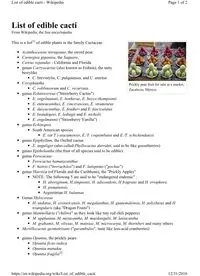
List of Edible Cacti-2016 PDF
Preview List of Edible Cacti-2016
Prickly pear fruit for sale at a market, Zacatecas, Mexico List of edible cacti From Wikipedia, the free encyclopedia This is a list[1] of edible plants in the family Cactaceae. ◾ Acanthocereus tetragonus, the sword pear, ◾ Carnegiea gigantea, the Saguaro, ◾ Cereus repandus - California and Florida ◾ genus Corryocactus (also known as Erdisia), the tasty berrylike ◾ C. brevistylis, C. pulquiensis, and C. erectus ◾ Coryphantha ◾ C. robbinsorum and C. recurvata. ◾ genus Echinocereus ("Strawberry Cactus") ◾ E. engelmannii, E. bonkerae, E. boyce-thompsonii ◾ E. enneacanthus, E. cincerascens, E. stramineus ◾ E. dasyacanthus, E. fendleri and E. fasciculatus ◾ E. brandegeei, E. ledingii and E. nicholii ◾ E. engelmannii ("Strawberry Vanilla") ◾ genus Echinopsis ◾ South American species ◾ E. (or T.) atacamensis, E./T. coquimbana and E./T. schickendanzii ◾ genus Epiphyllum, the Orchid cactus ◾ E. anguliger (also called Phyllocactus darrahii, said to be like gooseberries) ◾ genus Epithelantha (the fruit of all species said to be edible) ◾ genus Ferocactus ◾ Ferocactus hamatacanthus ◾ F. histrix ("borrachitos") and F. latispinus ("pochas") ◾ genus Harrisia (of Florida and the Caribbean), the "Prickly Apples" ◾ NOTE: The following 5 are said to be "endangered endemic" : ◾ H. aboriginum, H.simpsonii, H. adscendens, H fragrans and H. eriophora ◾ H. pomanensis ◾ Argentinian H. balansae ◾ Genus Hylocereus ◾ H. undatus, H. costaricensis, H. megalanthus, H. guatemalensis, H. polyrhizus and H. triangularis (aka "Dragon Fruits") ◾ genus Mammillaria ("chilitos" as they look like tiny red chili peppers) ◾ M. applanata, M. meiacantha, M. macdougalii, M. lasiacantha ◾ M. grahamii, M. oliviae, M. mainiae, M. microcarpa, M. thornberi and many others ◾ Myrtillocactus geometrizans ("garambulos", taste like less-acid cranberries) ◾ genus Opuntia, the prickly pears ◾ Opuntia ficus-indica ◾ Opuntia matudae ◾ Opuntia fragilis[2] Page 1 of 2 List of edible cacti - Wikipedia 12/31/2016 https://en.wikipedia.org/wiki/List_of_edible_cacti Cultivated prickly pear grown for food ◾ genus Pachycereus, ◾ Pachycereus pringlei, the Cardon ◾ P. schottii, the Senita and P. weberi, the Candelabro ◾ genus Peniocereus, ◾ Peniocereus greggii, the Arizona Queen of the Night ◾ P. johnstonii and P. serpentinus ◾ genus Pereskia ◾ P. aculeata, the "Barbados gooseberry" ◾ P. guamacho ◾ genus Stenocereus (quite sweet, but prone to ferment; hence the "agria" [="sour"])) ◾ S. fricii ("Pitayo de aguas"), S. griseus ("Pitayo de Mayo"), S. gummosus ("Pitahaya agria" ◾ S. pruinosus ("Pitayo de Octubre"), S. montanus ("Pitaya colorada") ◾ S. queretaroensis ("Pitaya de Queretaro"), S. standleyi ("Pita Marismena"), S. stellatus ("Xoconostle") ◾ S. thurberi ("Organ Pipe Cactus", "Pitayo Dulce") and S. treleasi ("Tunillo") References 1. Marmaro, John P. "What cacti produce edible fruit or are edible?". GardenWeb. 2. Kershaw, MacKinnon, Pojar (1998). Plants of the Rocky Mountains. Lone Pine Publishing. p. 181. ISBN 1-55105-088-9. Retrieved from "https://en.wikipedia.org/w/index.php?title=List_of_edible_cacti&oldid=757403564" Categories: Cacti and humans Edible plants ◾ This page was last modified on 30 December 2016, at 13:57. ◾ Text is available under the Creative Commons Attribution-ShareAlike License; additional terms may apply. By using this site, you agree to the Terms of Use and Privacy Policy. Wikipedia® is a registered trademark of the Wikimedia Foundation, Inc., a non-profit organization. Page 2 of 2 List of edible cacti - Wikipedia 12/31/2016 https://en.wikipedia.org/wiki/List_of_edible_cacti
